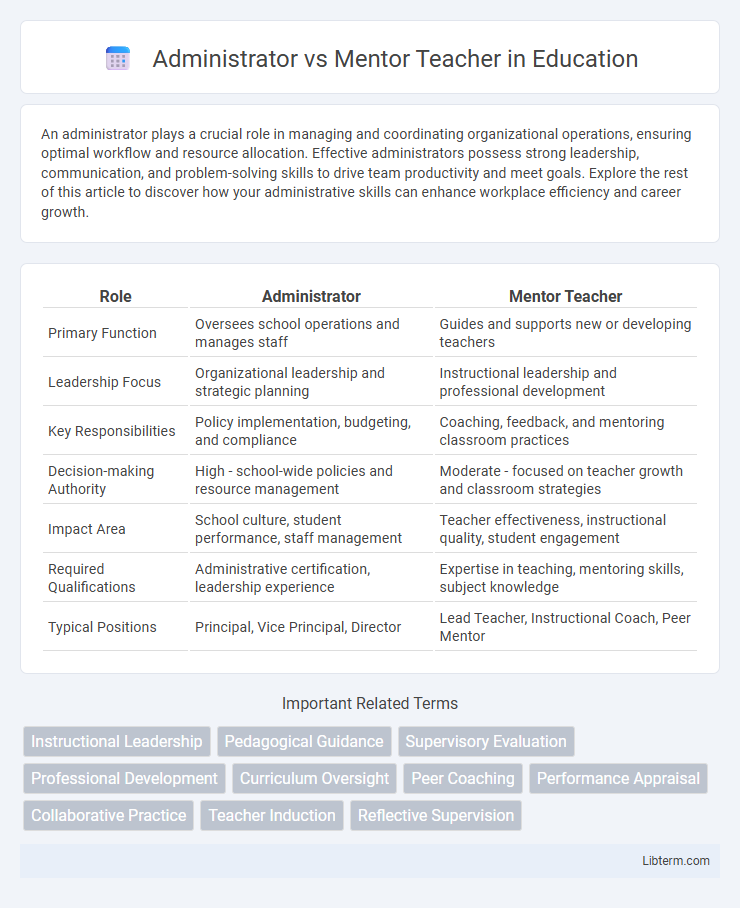An administrator plays a crucial role in managing and coordinating organizational operations, ensuring optimal workflow and resource allocation. Effective administrators possess strong leadership, communication, and problem-solving skills to drive team productivity and meet goals. Explore the rest of this article to discover how your administrative skills can enhance workplace efficiency and career growth.
Table of Comparison
| Role | Administrator | Mentor Teacher |
|---|---|---|
| Primary Function | Oversees school operations and manages staff | Guides and supports new or developing teachers |
| Leadership Focus | Organizational leadership and strategic planning | Instructional leadership and professional development |
| Key Responsibilities | Policy implementation, budgeting, and compliance | Coaching, feedback, and mentoring classroom practices |
| Decision-making Authority | High - school-wide policies and resource management | Moderate - focused on teacher growth and classroom strategies |
| Impact Area | School culture, student performance, staff management | Teacher effectiveness, instructional quality, student engagement |
| Required Qualifications | Administrative certification, leadership experience | Expertise in teaching, mentoring skills, subject knowledge |
| Typical Positions | Principal, Vice Principal, Director | Lead Teacher, Instructional Coach, Peer Mentor |
Understanding the Roles: Administrator vs Mentor Teacher
Administrators oversee school operations, implement policies, manage staff, and ensure compliance with educational standards, focusing on organizational leadership and resource allocation. Mentor teachers provide instructional guidance, support professional development, and foster teaching effectiveness through direct classroom collaboration and feedback. The distinct roles highlight administrators' strategic management responsibilities versus mentor teachers' hands-on mentorship aimed at improving instructional practices.
Core Responsibilities and Functions
Administrators primarily oversee school operations, manage staff, enforce policies, and allocate resources to ensure a safe and productive learning environment. Mentor teachers focus on supporting and guiding novice educators through instructional coaching, classroom management strategies, and professional development. While administrators emphasize organizational leadership and compliance, mentor teachers concentrate on fostering teaching effectiveness and student achievement.
Leadership Styles and Approaches
Administrators typically employ authoritative and strategic leadership styles focused on policy implementation, organizational efficiency, and maintaining school-wide standards, while mentor teachers adopt transformational and facilitative approaches centered on supporting individual teacher growth and fostering collaborative learning environments. The administrative role emphasizes decision-making, resource management, and compliance oversight, contrasting with the mentor teacher's emphasis on personalized guidance, skill development, and reflective practice within the classroom. Effective educational leadership integrates both roles by balancing broad institutional goals with tailored mentorship that enhances teacher efficacy and student outcomes.
Impact on School Culture and Climate
Administrators shape school culture by setting policies and leading strategic initiatives that create a safe, inclusive environment fostering academic excellence and staff collaboration. Mentor teachers directly influence school climate through daily interactions, modeling effective teaching practices, and supporting professional growth among peers. Both roles are crucial: administrators provide vision and resources, while mentor teachers cultivate trust and positive relationships within the classroom and staff community.
Collaboration and Teamwork Dynamics
Administrators oversee school-wide policies and foster a collaborative environment by coordinating between staff, students, and parents, ensuring alignment with institutional goals. Mentor teachers engage directly with mentees, promoting professional development through hands-on guidance, feedback, and shared teaching strategies. Effective teamwork dynamics arise when administrators support mentor teachers by providing resources and recognizing mentorship efforts, creating a cohesive culture of continuous learning and instructional improvement.
Professional Development Contributions
Administrator roles in professional development primarily involve designing organizational strategies, allocating resources, and evaluating program effectiveness to enhance teacher performance and student outcomes. Mentor teachers contribute directly by providing personalized guidance, modeling instructional strategies, and fostering reflective practices that support novice teachers' growth and classroom efficacy. Together, administrators and mentor teachers create a comprehensive professional development system that integrates policy-making with hands-on teaching support.
Decision-Making Authority and Influence
Administrators hold formal decision-making authority over school policies, resource allocation, and staff evaluations, directly impacting the institution's operational framework. Mentor teachers influence decision-making through guidance and support, shaping teaching practices and professional development without holding official power in administrative decisions. Their influence is often indirect, fostering a collaborative environment that affects classroom-level improvements rather than systemic changes.
Challenges and Opportunities in Each Role
Administrators face challenges in balancing operational management with strategic leadership, often navigating complex organizational dynamics and resource constraints while fostering a positive school culture. Mentor teachers encounter the challenge of providing personalized support and professional development to novice educators, requiring strong communication skills and patience to address diverse teaching styles and learning needs. Opportunities for administrators include driving systemic change and policy implementation, whereas mentor teachers benefit from directly influencing instructional quality and teacher retention through hands-on mentorship.
Skill Sets and Qualifications Required
Administrator roles require strong leadership, organizational management, and decision-making skills, typically supported by advanced degrees in education administration or leadership. Mentor Teachers need expertise in curriculum design, instructional strategies, and student assessment, along with substantial classroom experience and often hold state teaching certifications or advanced degrees in education. Both positions demand excellent communication abilities and a commitment to fostering professional development, but administrators focus more on systemic management while mentor teachers emphasize instructional support.
Choosing the Right Path: Administrator or Mentor Teacher
Choosing between an administrator and a mentor teacher depends on career goals and skill sets. Administrators focus on leadership, policy implementation, and school management, requiring strong organizational and decision-making abilities. Mentor teachers prioritize guiding and supporting new educators with instructional strategies and classroom management, emphasizing collaboration and professional development.
Administrator Infographic

 libterm.com
libterm.com